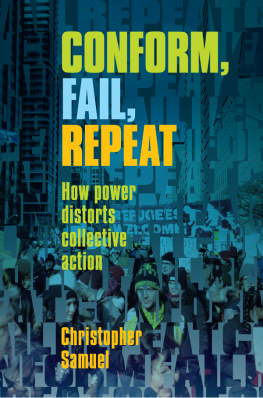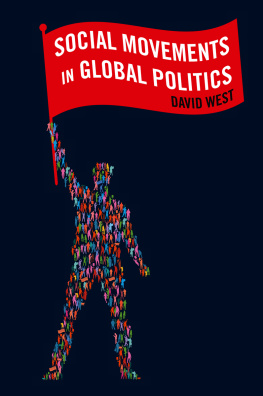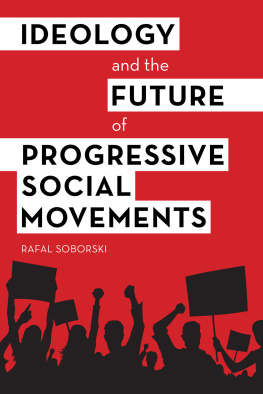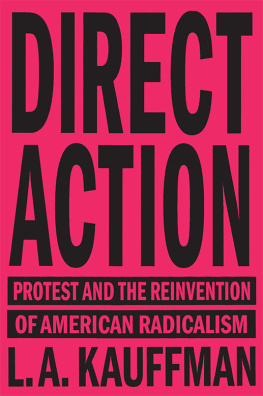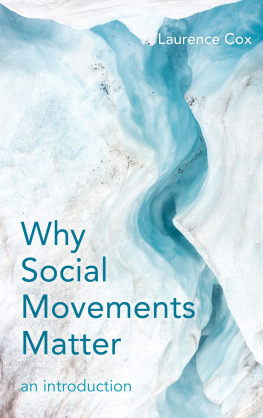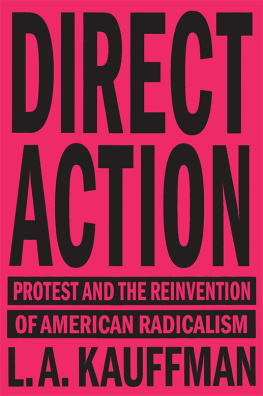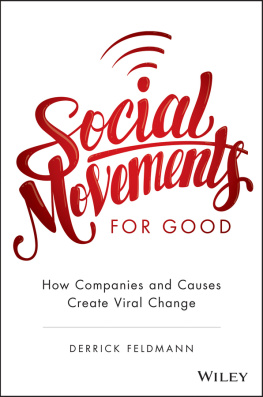CONFORM, FAIL, REPEAT
In Conform, Fail, Repeat, Christopher Samuel presents a thought-provoking and timely exposition on the sociology of social movements. Drawing upon the concepts articulated by Pierre Bourdieu, Samuel provides fresh insights and new ways of thinking about power and dominance within collective struggles for justice, the conformity and failure inherent to social movement participation, and the conflict between the competing visions that characterize social movementsradical transformative change or the immediate elimination of suffering. Conform, Fail, Repeat concludes by sketching out a new model of symbolic democracy, which academics and activists alike should find to be challenging and informative.
Tom Warner, Queer activist and author of Never Going Back, A History of Queer Activism in Canada and Losing Control, Canadas Social Conservatives in the Age of Rights
What might the next left look like? Putting the theories of Pierre Bourdieu to impressive and challenging work, Christopher Samuel suggests a critical and realist approach to twenty-first-century movements struggling for human emancipation. Looking at specific moments including the G20 protests and Black Lives Matter, Samuel provides refreshingly original and non-polemical insight into some of the most contentious issues those movements facesuch as how to reconcile political effectiveness with internal democracy and how to avoid the seemingly perpetual pattern of movements losing sight of the revolutionary visions that inspired them. A must-read for leftists as they seek to understand, and to change the very shape of, a storm-tossed political world.
Ian McKay, author of Reasoning Otherwise and Rebels, Reds, Radicals

Conform, Fail, Repeat
2017 Christopher Samuel
First published in 2017 by
Between the Lines
401 Richmond Street West
Studio 281
Toronto, Ontario M5V 3A8
Canada
1-800-718-7201
www.btlbooks.com
All rights reserved. No part of this publication may be photocopied, reproduced, stored in a retrieval system, or transmitted in any form or by any means, electronic, mechanical, recording, or otherwise, without the written permission of Between the Lines, or (for photocopying in Canada only) Access Copyright, 56 Wellesley Street West, Suite 320, Toronto, Ontario, M5S 2S3.
Every reasonable effort has been made to identify copyright holders. Between the Lines would be pleased to have any errors or omissions brought to its attention.
Library and Archives Canada Cataloguing in Publication
Samuel, Christopher, author
Conform, fail, repeat: how power distorts collective action / Christopher Samuel.
Includes bibliographical references and index.
Issued in print and electronic formats.
ISBN 978-1-77113-337-1 (softcover).ISBN 978-1-77113-338-8 (EPUB).
ISBN 978-1-77113-339-5 (PDF)
1. Bourdieu, Pierre, 1930-2002. 2. Power (Social sciences). 3. Social movements. 4. Conformity. I. Title.
HN49.P6S26 2017 | 303.3 | C2017-903561-4 |
C2017-903562-2 |
Text and cover design by David Vereschagin, Quadrat Communications
We acknowledge for their financial support of our publishing activities: the Government of Canada; the Canada Council for the Arts, which last year invested $153 million to bring the arts to Canadians throughout the country; and the Government of Ontario through the Ontario Arts Council, the Ontario Book Publishers Tax Credit program, and the Ontario Media Development Corporation.

Preface
This book offers a philosophically informed study of power and collective struggles for justice. In Beyond Good and Evil, Friedrich Nietzsche tells us, There is a point in every philosophy when the philosophers conviction appears on the stageor to use the language of an ancient Mystery: Adventavit asinus / Pulcher et fortissimus (The ass appears, beautiful and most brave). Since its appearance is inevitable, here is my philosophical conviction: Power is supple, its mechanisms hide as often as they reveal themselves, and for those who lack power, there is no obvious strategy for combatting injustice without replicating it. I am also convinced, however, that for groups that are systematically disempowered, that are exploited, excluded, humiliated, or simply made invisible, acting collectively is the only way to overcome the mechanisms by which the powerful maintain their advantages.
Let me also acknowledge the emotional and biographical roots of that conviction. At bottom, my ideas about social movements are informed by feelings of loss, disappointment, and frustration. When I first came out as a queer man, in Alberta in 1998, I had already been involved in left-wing politics for a number of years and was a committed Marxist. Naively, I expected LGBT politics to fit neatly with my radical economic leanings, but I came out in a time and place where liberationist and queer impulses were already more or less swamped by a rights-based political strategy focused on relationship rights and anti-discrimination legislation.
In particular, I recall an activist meeting in Edmonton where the chair, a lawyer and long-time activist, easily sidelined suggestions she didnt like by asserting that one good idea per meeting is enough, as though that were a well-established rule. Not coincidentally, the radical and difficult ideas never seemed to meet the one good idea quota. Power imbalances are not just about laws and police. They are about cultural skills, social connections, and the ability to present partisan preferences as neutral and objective.
Over the next decade, I became increasingly involved with the New Democratic Party, eventually working as a legislative staffer. I also sat on numerous NDP committees, including election planning committees, and worked on the central campaigns for a number of elections. Theres nothing like a paid role to teach you the importance of compromise, making the best use of scarce resources, and the need for concrete, practical assessments of political opportunity. I experienced a personal deradicalization that was directly comparable to the deradicalization I mourned in lesbian and gay politics.
Its a hard thing when your head and your heart are so badly aligned. This book is the result of my effort to think through that misalignment and to reconcile my radical impulses with the immediate demands of political life. I am not sure it actually achieves that reconciliation. Instead, the book creates space for being okay with that lack of alignment. I hope it helps people who care about justice to recognize when sincerely held commitments to radical change and pragmatic effectiveness are mutually exclusive andas importantlyto learn how to act within those kinds of impossible spaces.
I will use key concepts from sociologist Pierre Bourdieu to pry open that door. Bourdieus work brings together a number of philosophical and sociological trajectories and commits itself to centring social conflict. It is easy to get lost in some of his technical language (habitus, allodoxia, and so on), but ultimately, he gives us a way of thinking about how people navigate social spaces that are fundamentally built on the conflicting goals and resources of people in those spaces. Nonetheless, Marxists may find Bourdieus use of the term capital to be somewhat idiosyncratic. For Marxists, capital has specific function and meaning within political economy; Bourdieu uses the term to describe context-appropriate resources. I will explain capital, habitus, and other technical terms as the argument unfolds.

